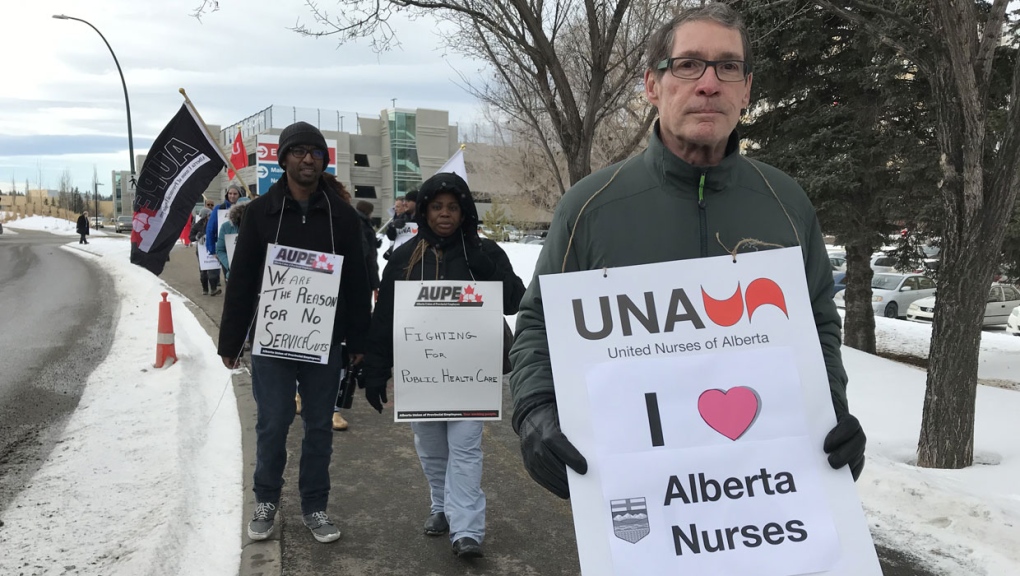Alberta nurses ratify contract that includes 4.25 per cent wage increase over 4 years
 Thousands of supporters of Alberta's health-care workers staged demonstrations throughout the province on Thursday to protest cuts by the Kenney government.
Thousands of supporters of Alberta's health-care workers staged demonstrations throughout the province on Thursday to protest cuts by the Kenney government.
Alberta's nurses have overwhelmingly ratified a new collective bargaining agreement, closing the book on what the union calls some of the most contentious and bruising negotiations in its history.
The vote was 87 per cent in favour of a four-year deal that includes a 4.25 per cent pay bump over the course of the contract.
“The bargaining committee felt strongly the mediator's recommendation issued on Dec. 21 was a fair deal that will benefit our members and also fair to the people of Alberta,” Heather Smith, president of the United Nurses of Alberta, said in a statement Thursday.
The UNA statement said the vote “brings to an end one of the most prolonged and arduous negotiations in the provincial nursing union's 44-year history.”
The contract is retroactive to 2020 and ends on March 31, 2024.
It includes a one-time lump sum payment of one per cent for 2021 in recognition of nurses' contributions during the COVID-19 pandemic.
There will be $5 million a year toward recruitment and retention strategies in rural and remote areas, and $2.5 million a year for relocation assistance.
There will also be more psychological and mental health supports for nurses and the creation of a union-employer workload advisory committee.
The deal was agreed to by 130 affected UNA locals, whose members make up the bulk of the union's 30,000 registered nurses and registered psychiatric nurses.
Premier Jason Kenney's government had been seeking a three per cent wage cut and other contract rollbacks from nurses, arguing that Alberta's nurses were paid more than those in other jurisdictions and that a tight budget required concessions.
“Alberta can no longer afford to be an outlier,” Finance Minister Travis Toews said in a statement as late as July 6, 2021.
Toews suggested at one point that nurses were putting their needs ahead of their patients' by pushing to resume collective bargaining during the pandemic.
The union, in turn, accused Toews of “grossly insulting” hypocrisy from a government that found time for collective talks with physicians and other public sector unions, but not for nurses.
It was a high-wire tightrope situation for the government, demanding wage clawbacks from nurses battling COVID-19 on the front lines while also risking the possibility of a nurses strike during a pandemic.
“Alberta Health Services' willingness to move away from its initial demands for wage cuts and to drop its efforts to impose more than 200 rollbacks made this agreement possible,” said David Harrigan, who led the UNA's bargaining committee.
Kenney told reporters that the deal respects the work of nurses while also meeting the government's goal to rein in budget spending.
“I believe that this collective bargaining agreement is a win-win,” Kenney said late Thursday.
“It ensures that Alberta nurses continue to be the best-compensated in Canada (and) at the same time it brings their compensation closer to the national average in other provinces.”
This report by The Canadian Press was first published Jan. 27, 2022.
CTVNews.ca Top Stories

Poilievre will do 'anything to win,' must condemn Alex Jones endorsement: Trudeau
Prime Minister Justin Trudeau is ramping up his attacks on Conservative Leader Pierre Poilievre as he promotes his government's federal budget.
'My stomach dropped': Winnipeg man speaks out after being criminally harassed following single online date
A Winnipeg man said a single date gone wrong led to years of criminal harassment, false arrests, stress and depression.
New evidence challenges the Pentagon's account of a horrific attack as the U.S. withdrew from Afghanistan: CNN exclusive
New video evidence uncovered by CNN significantly undermines two Pentagon investigations into an ISIS-K suicide attack outside Kabul airport, during the American withdrawal from Afghanistan in 2021.
'One of the single most terrifying things ever': Ontario couple among passengers on sinking tour boat in Dominican Republic
A Toronto couple are speaking out about their 'extremely dangerous' experience on board a sinking tour boat in the Dominican Republic last week.
All Alberta wildfires to date in 2024 believed to be human-caused: province
There are 63 wildfires burning in Alberta's forest protection area as of Wednesday morning and seven mutual aid fires, including one in the Municipal District of Peace.
Video shows suspects waving weapons, smashing glass in Toronto jewelry store robbery
Arrests have been made after five men were captured on video rampaging through a jewelry store in Toronto, waving weapons and smashing glass display cases.
Pilot proposes to flight attendant girlfriend in front of passengers
A Polish pilot proposed to his flight attendant girlfriend during a flight from Warsaw to Krakow, and she said yes.
Ottawa injects another $36M into fund for those seriously injured or killed by vaccines
The federal government has added $36.4 million to a program designed to support people who have been seriously injured or killed by vaccines since the end of 2020.
Ex-SNC executive sentenced to prison term in bridge bribery case
The RCMP says a former SNC-Lavalin executive has been sentenced to three and a half years in prison in connection with a bribery scheme for a bridge repair contract in Montreal.































